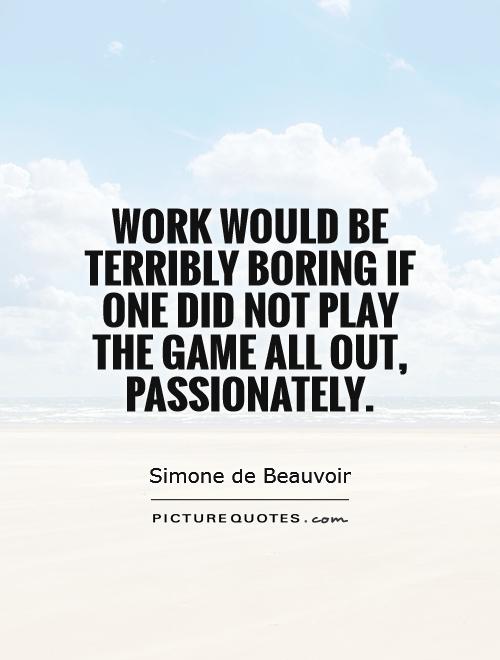Work would be terribly boring if one did not play the game all out, passionately

Work would be terribly boring if one did not play the game all out, passionately
Simone de Beauvoir, a prominent French existentialist philosopher and feminist writer, believed in the importance of living life passionately and fully engaging in one's work. In her seminal work, "The Second Sex," de Beauvoir argued that women are often marginalized and oppressed in society, and she advocated for women to break free from societal constraints and live authentically.De Beauvoir's philosophy can be applied to the idea that work would be terribly boring if one did not play the game all out, passionately. In the context of work, de Beauvoir would likely argue that individuals should not simply go through the motions of their job, but rather should approach their work with enthusiasm, dedication, and a sense of purpose. By fully engaging in their work and playing the game all out, individuals can find fulfillment, meaning, and satisfaction in their professional lives.
For de Beauvoir, playing the game all out in one's work is a form of self-expression and self-actualization. By bringing passion and enthusiasm to their work, individuals can assert their autonomy and assert their agency in the world. De Beauvoir believed that individuals should not be passive recipients of their circumstances, but rather should actively shape their own destinies through their actions and choices.
Furthermore, de Beauvoir would likely argue that playing the game all out in one's work is a way to challenge societal norms and expectations. By approaching their work with passion and dedication, individuals can defy stereotypes and break free from the constraints of gender, class, and other social categories. In this way, playing the game all out in one's work can be a form of resistance and a way to assert one's individuality and uniqueness.












 Friendship Quotes
Friendship Quotes Love Quotes
Love Quotes Life Quotes
Life Quotes Funny Quotes
Funny Quotes Motivational Quotes
Motivational Quotes Inspirational Quotes
Inspirational Quotes